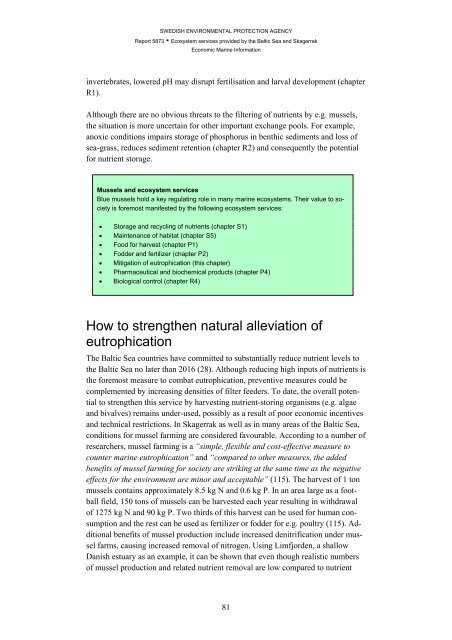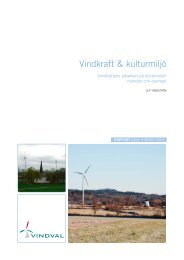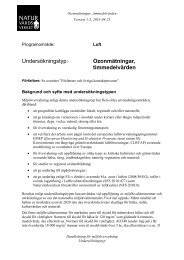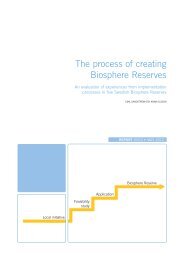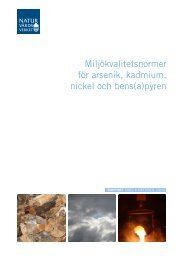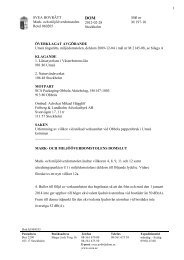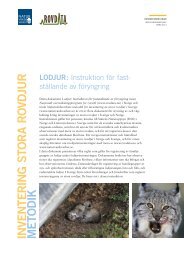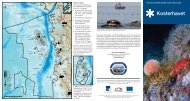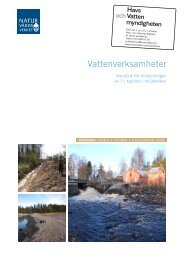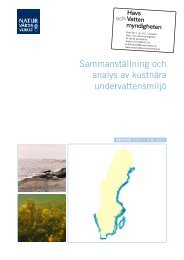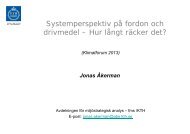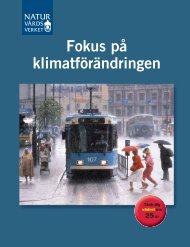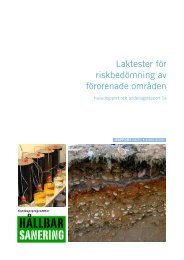Ecosystem services provided by the Baltic Sea ... - Naturvårdsverket
Ecosystem services provided by the Baltic Sea ... - Naturvårdsverket
Ecosystem services provided by the Baltic Sea ... - Naturvårdsverket
Create successful ePaper yourself
Turn your PDF publications into a flip-book with our unique Google optimized e-Paper software.
SWEDISH ENVIRONMENTAL PROTECTION AGENCY<br />
Report 5873 • <strong>Ecosystem</strong> <strong>services</strong> <strong>provided</strong> <strong>by</strong> <strong>the</strong> <strong>Baltic</strong> <strong>Sea</strong> and Skagerrak<br />
Economic Marine Information<br />
invertebrates, lowered pH may disrupt fertilisation and larval development (chapter<br />
R1).<br />
Although <strong>the</strong>re are no obvious threats to <strong>the</strong> filtering of nutrients <strong>by</strong> e.g. mussels,<br />
<strong>the</strong> situation is more uncertain for o<strong>the</strong>r important exchange pools. For example,<br />
anoxic conditions impairs storage of phosphorus in benthic sediments and loss of<br />
sea-grass, reduces sediment retention (chapter R2) and consequently <strong>the</strong> potential<br />
for nutrient storage.<br />
Mussels and ecosystem <strong>services</strong><br />
Blue mussels hold a key regulating role in many marine ecosystems. Their value to society<br />
is foremost manifested <strong>by</strong> <strong>the</strong> following ecosystem <strong>services</strong>:<br />
Storage and recycling of nutrients (chapter S1)<br />
Maintenance of habitat (chapter S5)<br />
Food for harvest (chapter P1)<br />
Fodder and fertilizer (chapter P2)<br />
Mitigation of eutrophication (this chapter)<br />
Pharmaceutical and biochemical products (chapter P4)<br />
Biological control (chapter R4)<br />
How to streng<strong>the</strong>n natural alleviation of<br />
eutrophication<br />
The <strong>Baltic</strong> <strong>Sea</strong> countries have committed to substantially reduce nutrient levels to<br />
<strong>the</strong> <strong>Baltic</strong> <strong>Sea</strong> no later than 2016 (28). Although reducing high inputs of nutrients is<br />
<strong>the</strong> foremost measure to combat eutrophication, preventive measures could be<br />
complemented <strong>by</strong> increasing densities of filter feeders. To date, <strong>the</strong> overall potential<br />
to streng<strong>the</strong>n this service <strong>by</strong> harvesting nutrient-storing organisms (e.g. algae<br />
and bivalves) remains under-used, possibly as a result of poor economic incentives<br />
and technical restrictions. In Skagerrak as well as in many areas of <strong>the</strong> <strong>Baltic</strong> <strong>Sea</strong>,<br />
conditions for mussel farming are considered favourable. According to a number of<br />
researchers, mussel farming is a “simple, flexible and cost-effective measure to<br />
counter marine eutrophication” and “compared to o<strong>the</strong>r measures, <strong>the</strong> added<br />
benefits of mussel farming for society are striking at <strong>the</strong> same time as <strong>the</strong> negative<br />
effects for <strong>the</strong> environment are minor and acceptable” (115). The harvest of 1 ton<br />
mussels contains approximately 8.5 kg N and 0.6 kg P. In an area large as a football<br />
field, 150 tons of mussels can be harvested each year resulting in withdrawal<br />
of 1275 kg N and 90 kg P. Two thirds of this harvest can be used for human consumption<br />
and <strong>the</strong> rest can be used as fertilizer or fodder for e.g. poultry (115). Additional<br />
benefits of mussel production include increased denitrification under mussel<br />
farms, causing increased removal of nitrogen. Using Limfjorden, a shallow<br />
Danish estuary as an example, it can be shown that even though realistic numbers<br />
of mussel production and related nutrient removal are low compared to nutrient<br />
81


